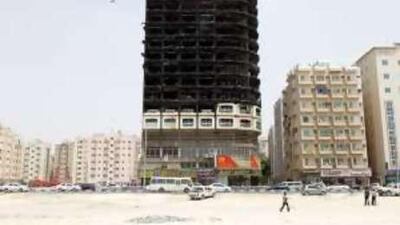SHARJAH // More than 200 families have been relocated after fire destroyed their 14-storey residential building on Tuesday evening, the biggest fire ever to gut such a structure in the emirate according to local authorities. The fire started at around 5.30pm in the al Kuwait tower and required more than five hours to extinguish. More than 100 firefighters from all over the country participated in the effort to put out the blaze. Six people were injured, with five of them suffering minor burns. There were no fatalities. "We have seen big fires here but not at any time did fire burn completely a whole tower like this," said Col Waheed al Serkal, the Sharjah Civil Defence director general. "This fire is equivalent to that of factories and industries we have handled before."
Large-scale fires have been a regular occurrence in the northern emirates as the weather has turned hotter. Many have occurred in industrial areas, some of which are located near housing developments. Five warehouses belonging to the National Paints Co were destroyed in May in a blaze that affected local residents as the fire spread. There were at least 100 people in the al Kuwait tower at the time of the fire, all of whom were safely evacuated, said Col Mohammed Eid al Madhloom, the head of the Sharjah Police operations room. ykakande@thenational.ae

